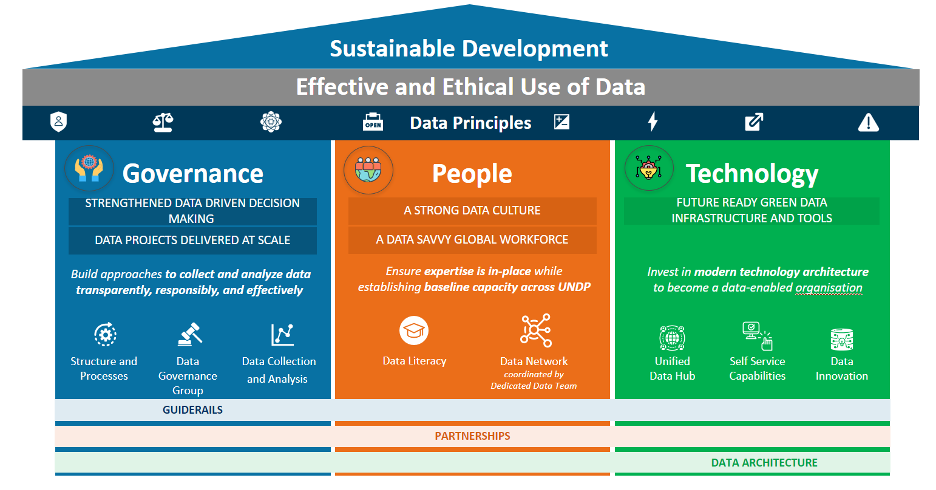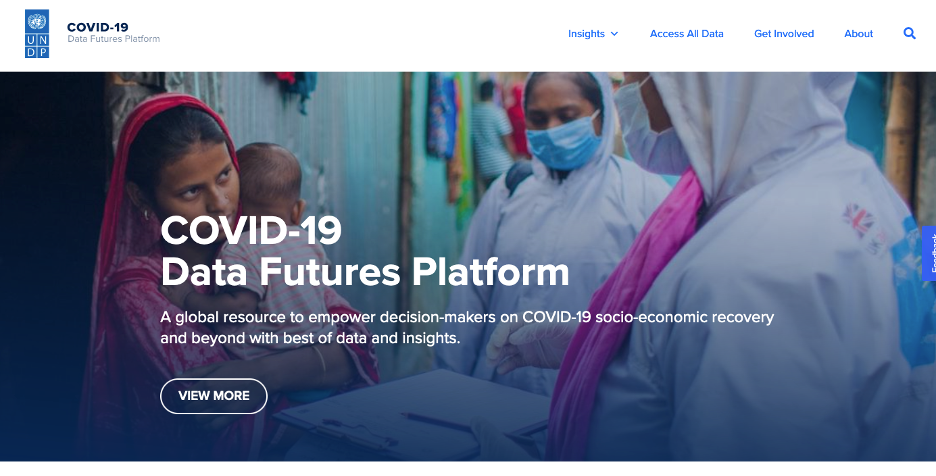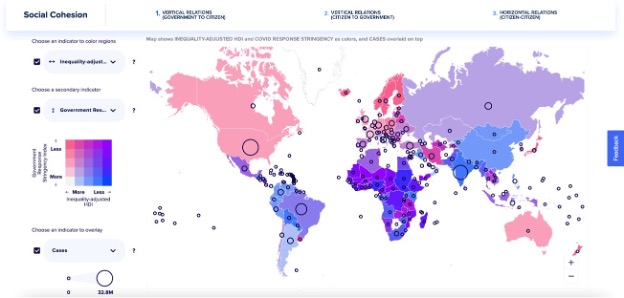Microsoft Azure Power Hour features UNDP‘s Data Futures Platform and NextGen Data Hub
Microsoft’s Tech for Social Impact group hosted UNDP and UNICC for its 9 September 2021 Azure Power Hour to discuss UNDP’s new, integrated data platforms that aim to forge novel data capabilities and drive results in delivering on the Agenda 2030.
With an audience of some 100 participants from a number of UN Agencies, the event was an excellent opportunity to showcase the collaboration between Microsoft, UNDP and UNICC and share a roadmap of opportunities for other organizations to embrace a unified data strategy.
UNICC works as an extension of our technology team. If you look at UNDP tech portfolios you will see that for many services UNICC provides support and advanced solutions in order to complete a project or service.
Diwen Xu, Application Delivery and Data Warehousing Lead, UNDP
The Azure Power Hour focused on UNDP’s data strategy, aligned to the UN Secretary-General’s Data Strategy, with its vision to building a UNDP ecosystem that unlocks full data potential for better decisions and stronger support to people and the planet. Presenters shared the fostering enablers of the UNDP Data Strategy, from people and culture to data governance, partnerships and technology to deliver a transformative environment for better insights and quality decision-making.
UNDP’s Gayan Peiris, Data and Technology Strategist, together with Diwen Xu, Application Delivery and Data Warehousing Lead, discussed UNDP‘s data governance model and the current UNDP data platform landscape (with multitudes of unconnected data platforms and data sources). They also presented the organization’s plan for a unified data environment, with a central data architecture, data lake, optimised data catalogue and dashboards, all hosted in Microsoft Azure.
Effective and ethical use of data rests on the three pillars of data governance, people and technology. Data governance is the process of managing availability, usability, integrity and security of data in UNDP’s enterprise systems, based on internal data standards and policies that control data usage.
An effective data governance model ensures that data is consistent and trustworthy and doesn’t get misused. It’s increasingly critical as UNDP, like other UN Agencies, rely more on data analytics to help optimize operations and drive business decision-making across the organization. UNDP’s data governance program works to create standards and policies for governing data, as well as data implementation and enforcement procedures.

UNDP Data Strategy Governance. Credit: UNDP
Gayan Peiris detailed how UNDP is harnessing data to create a strategic asset for the organization, with two use cases in particular: the Data Futures Platform, an open access, interactive platform that aggregates multiple sources of information to assist with COVID-19 response and recovery efforts; and the NextGen Data Hub, a dedicated data and tools repository. According to Gayan, these assets are helping streamline siloed initiatives across UNDP for a long-term, action-focused data strategy.
UNDP’s partnership with Microsoft started a year ago, with Microsoft sharing some of its AI and machine learning capabilities to support sustainble development practices. UNDP and UNICC are long standing partners working on technology projects and tools that enable swifter operations. The new Data and Analytics team at UNICC brought its expertise to bear on this new data roadmap path.

Credit: UNDP (Data Futures Platform (https://data.undp.org/)
The UNDP Data Futures Platform
Drawing on data from across the UN System and its partners, the Data Futures Platform provides cutting-edge analyses, visualisations and simulations that focus on the most critical COVID-19 recovery challenges in an interactive way, for rapid decision making. The platform provides a global dashboard for vaccine equity, an assessment tool on the impact of COVID-19 on the SDGs, data and insights from UN75 and a Global Recovery Observatory that brings transparency to government spending during the pandemic.
Diwen Xu presented the technical aspects of the unified data hub architecture, which has a dedicated repository of data for operational and programme use, self-service capabilities, and an integration hub for UN-wide and external data sharing capabiilties.

Credit: UNDP
He went on to discuss how UNDP is going to intake data sets, perform analytics and visualise the data.
Diwen added that UNICC has been working as an extension of UNDP”s technology team, with the added benefits of a first rate Data and Analytics team now in place. UNICC provides support and advanced services to UNDP technology portfolios, including data and analytics innovations.
NextGen Data Hub
Together with Anusha Dandapani, Chief, Data and Analytics Unit, UNICC, Gayan and Diwen talked about UNDP’s NextGen Data Hub, a unified data architecture which UNICC and UNDP are working on. UNICC is helping design and implement a new generation of improved cloud data to be included in the architecture.
Gartner (2019) provides an interesting perspective on an integrated data hub: “it’s not technology, but an approach to effectively determine where, when and for whom data needs to be mediated, shared and then linked and/or persisted. A data hub is a logical architecture which enables data sharing by connecting producers of data (applications, processes, and teams) with consumers of data (other applications, process, and teams). Endpoints interact with the data hub, provisioning data or receiving data and the hub provides a point of governance, mediation, and visibility as to how data is flowing within the enterprise.“
The NextGen Data Hub, which is based on Microsoft Azure cloud services, will be able to ingest, store, analyze, model, structure, catalogue and share all kind of data sets in a modern, privacy-protecting, and cost-effective way. It will interact and inter-operate with other cloud data providers. This new cloud data platform will allow UNDP to become a more predictive and advanced, data-driven organization. The existing data components, hosted at a UNICC data centre, will be migrated into this new data platform.
We are building a system to collect and analyse data transparently, responsibly and effectively, ensuring adequate workforce capacity and expertise, with the right investments in green technology, architecture, infrastructure and tools to make UNDP a data-centered organization.
Francisco Alcázar, UNICC data focal point for the UNDP NextGen Data Hub
The NextGen data platform will integrate some new capabilities and services, such as data governance and catalogue services implemented using Azure Purview, some advanced analytics components for AI and machine learning, cognitive services and text document analysis using Azure Synapse, a new data hub portal and an API management gateway for internal and external/public users. The platform will also support integration of third-party services for legacy applications.
UNICC improved and implemented the analysis and first steps by Microsoft to deliver the full, cloud-based data platform solution using Azure data services.
The NextGen data platform leverages the best expertise and support from Microsoft and UNICC. Future plans for the platform include integration with other cloud-based services.

